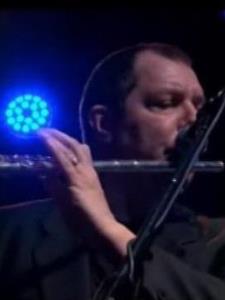06/28/19
Learn Guitar (and theory) one key at a time?
So I'm trying to learn guitar for like the 5th time in my life. I've taken formal lessons, read books, even been in a garage band for fun but have only managed to memorize chord progressions and...
more
06/27/19
Etymology of word "Octave"?
How come the etymology of the word octave is related to the number *eight*, when the numbers that you would associate with the meaning of the word are either two – doubling of the frequency – , or...
more
06/27/19
Is music theory universal?
I'm currently 17 years old and want to dedicate myself to music. I've listened to different styles of music now: jazz, funk,groove also classical (Bob acri>any pop Idol in 2018). 2 weeks ago I...
more
06/27/19
Diminished and augmented key signature?
Now I know that augmented chords and diminished chords are dissonant normally. Arpeggiate it and it is much more consonant. 3rd octave and it is much more consonant.
But can you actually have...
more
06/27/19
Confusion in naming intervals?
If I play C E G on the piano, then G acts as a perfect 5th, but if I play G C E and the lowest note (just below the C) is G, can I still call G a perfect 5th of C maj? Because the interval now...
more
06/27/19
How do I choose the type of chord for an specific scale?
How do I choose the type of chord for an specific scale?
06/27/19
E# note in the D# Major scale. What does it mean?
I've been having this doubt for a quite a while and haven't been able to find a satisfying answer. Is the 'E#' note technically an F? If so, why does it not exist on the chromatic scale like other...
more
06/27/19
How many types of modulation are there?
I know a few types of modulation off the top of my head like common chord modulation and and chromatic modulation, but I was wondering how many different types of modulation are there and what are...
more
06/27/19
Melody And Intervals?
How do composers think about intervals like minor, major,etc to compose melody? Eg I know playing major third will invoke happy mood....that is if we play C and then E creates happier...
more
06/26/19
Is GbM7 to DbM7/F also a chromatic movement?
I was writing a song in Bbm key.
And the chord progression goes something like.
Bbm,GbM7, DbM7/F
In this situation does the GbM7 going to DbM7/F
also consider as chromatic progression ?
If it...
more
06/26/19
Can one measure the "distance" between chords? If so, how?
I was reading an article an the author gave the following sequence of chords: C A7 Dm G C I would like to measure the "distance" if there is such a thing between C and A7. Can this be done? In...
more
06/20/19
Is the diminished chord of the minor scale not used as much as the others?
I'm wondering if the diminished diatonic chord (ii-dim) in the minor scale functions like the major scale, where it's not used as often as the other six diatonic chords?
06/20/19
Do all modes make another mode when inverted?
I may just being going crazy but I was writing some music theory and noticed that if you reverse the whole steps and half steps of a mode it becomes another mode.
(W= whole tones H= half...
more
06/19/19
How does one measure the interval between two pitches?
What is the procedure for measuring the interval between two pitches?
How do I know if something is a fifth, sixth, or something else? Why, for instance, is C to D a second even though we only go...
more
06/18/19
Do seventh chords and extended chords create more dissonance?
I'm wondering if seventh and extended chords are used to create dissonance/tension where the more you get to the basic triad the more consonant the sound.
So C major > C major 7 > C major 9...
more
06/13/19
Does a cadence cover all "punctuation marks" in a musical phrase?
Does a cadence cover all "punctuation marks" in a musical phrase?
06/13/19
Does a walking bass line usually consist of chord tones?
Do we define a walking bass by it consisting of mainly chord tones? So it's just a skeleton of a chord progression? What if it wasn't just chord tones, would it still be considered a walking bass...
more
06/12/19
Can chord substitutions take place unrestrictedly without invalidating a progression?
Can chord substitutions take place unrestrictedly without invalidating a progression?
05/28/19
Notation without flats or sharps in equally tempered tuning?
Considering only equally tempered tuning, do full notes such as C, D, E, etc have any special characteristics compared to flats and sharps, so that they 'deserve' a separate letter?
If no, would...
more
04/06/19
How do you properly define diminished 9th, 11th and 13th chords?
I understand that a diminished 7th chord is defined by the intervals 1-b3-b5-bb7 and a half-diminished 7th chord is 1-b3-b5-b7, but how do you determine what intervals diminished (and...
more
03/27/19
Can someone explain the theory behind the changes in Superstition by Stevie Wonder?
I'm learning Stevie Wonder's Superstition on guitar (an awesome song) and I'm really curious about the theory behind the changes in the chorus. The intro and verse are just a riff in E minor...
more
03/26/19
Collective word for sharps and flats in the key signature?
On a mailing list I'm subscribed to, someone recently asked what the collective name was in English for the sharps and flats you find in the key signature. Apparently, the closest translation from...
more
03/18/19
Why are certain scales considered unstable?
The Locrian Mode is considered unstable - my question is what in it makes it unstable? What makes a scale stable (have better relation between the keys)?
Still looking for help? Get the right answer, fast.
Ask a question for free
Get a free answer to a quick problem.
Most questions answered within 4 hours.
OR
Find an Online Tutor Now
Choose an expert and meet online. No packages or subscriptions, pay only for the time you need.











